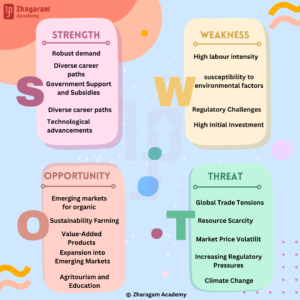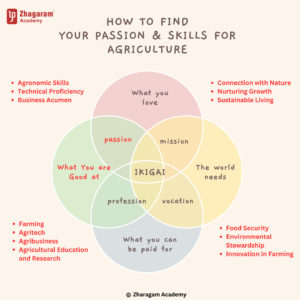Introduction
Exploring a career in agriculture? Learn how SWOT analysis and Ikigai can guide you to uncover your passion, interests, and skills in this dynamic field In a world increasingly driven by technology and services, agriculture remains a fundamental pillar of global sustainability and economic development. This series aims to shed light on the myriad career opportunities within the agriculture sector, helping aspiring professionals understand the field’s scope and discover their true passion for agriculture.
What is Agriculture?
Agriculture, at its core, involves the cultivation of plants and rearing of animals to produce food, fiber, medicinal plants, and other products to sustain and enhance life. It is one of the oldest and most essential industries, foundational to the development of civilizations and the sustenance of populations.
Why is Agriculture Important?
Agriculture plays a critical role in the global economy, providing the primary means of food production for human populations and raw materials for various industries. It is also pivotal in managing natural resources, maintaining ecological balance, and supporting rural communities. Moreover, agriculture is central to addressing challenges like food security, climate change, and sustainability.
Pros and Cons of a Career in Agriculture
Pros:
Stability and Necessity: Food production is perennial and essential, offering job security.
Diverse Opportunities: Careers span from agronomy and animal science to agribusiness and agricultural engineering.
Technological Integration– Increasing use of technologies like AI and IoT offers an exciting blend of traditional practices and modern tech.
Cons:
Physical Demands: Many agricultural roles require significant physical labor.
Economic Fluctuations: Income can be dependent on factors like weather and market prices.
Resource Intensity: High dependence on natural resources which are becoming increasingly scarce.
The Agriculture Market in India and Its Future
India stands as a testament to the vibrancy of agriculture, contributing significantly to its GDP and employing nearly 50% of the workforce. With initiatives like the Green Revolution and more recently, digital agriculture platforms, the sector is poised for transformation, focusing on sustainability and increased production efficiency.
Global Agriculture Markets
Globally, agriculture is diversifying and integrating more technology, shifting from traditional farming to precision agriculture. This evolution opens up new avenues for professionals interested in robotics, data science, and environmental sustainability
Finding Your Passion in Agriculture: SWOT Analysis

Strengths
Identifying strength, weaknesses related to career may be little bit difficult, so make it easier we have provided the complete SWOT analysis for Agriculture Career. Here are the strengths that can be highlighted in the SWOT analysis for a career in agriculture:
1. Global Impact: Agriculture has a profound impact on global economies and health. Professionals in this field contribute to global food security and sustainability efforts, which is increasingly crucial as the world population grows.
2. Cultural Significance: Agriculture is deeply rooted in many cultures and sustains cultural heritage through traditional farming practices. This can be appealing for individuals interested in maintaining or revitalizing cultural traditions.
3. Innovation and Research: There is a significant scope for innovation in agriculture, from developing new crop varieties to enhancing farming practices through scientific research. This offers exciting opportunities for those inclined towards research and development.
4. Government Support and Subsidies: Many countries offer substantial support and incentives for agriculture, including grants, subsidies, and tax exemptions. This can make it a financially attractive career option and facilitate more significant investment in sustainable practices.
5.Educational Opportunities: The sector is supported by numerous educational programs at universities and institutions worldwide, which continuously evolve to include the latest advancements in agricultural sciences. This provides a robust educational foundation for those entering the field.
6. Community and Networking: Agriculture often involves strong community ties and networks, which can provide social support and collaborative opportunities. It can be fulfilling to work in a sector where community-oriented values are prominent.
7. Environmental Stewardship: Careers in agriculture directly involve managing and interacting with the natural environment. This is ideal for those passionate about conservation and environmental stewardship, offering a direct way to impact environmental health positively.
These strengths highlight the diverse and impactful nature of careers in agriculture, underlining why it is an attractive sector for many individuals.
Weaknesses
Here are five key weaknesses that can be considered in the SWOT analysis for a career in agriculture:
1. Vulnerability to Climate Change: Agriculture is highly susceptible to changes in weather patterns and climate conditions. Droughts, floods, and other extreme weather events can significantly impact productivity and stability in the sector.
2. High Initial Investment: Starting a farm or agricultural business often requires substantial initial capital for land, equipment, and infrastructure. This high barrier to entry can deter new entrants and limit growth opportunities for small-scale farmers.
3. Labor Shortages: The agricultural sector frequently faces labor shortages, especially in developed countries where fewer people are entering the field. This can lead to increased labor costs and challenges in scaling operations.
4. Regulatory Challenges: Agriculture is one of the most heavily regulated industries, with stringent laws governing land use, food safety, animal welfare, and environmental protection. Navigating these regulations can be complex and time-consuming.
5. Pesticide and Chemical Use: Dependence on pesticides and other chemicals in conventional farming practices raises environmental and health concerns. This reliance can also lead to soil degradation and reduced biodiversity, posing long-term sustainability challenges.
These weaknesses highlight some of the significant challenges faced by professionals in the agriculture sector, which are crucial for understanding the full landscape of career opportunities and constraints in this field.
Opportunities
1. Sustainable and Organic Farming: There is a growing demand for organic and sustainable products, providing opportunities for farmers and businesses to adopt environmentally friendly practices and cater to this niche market.
2. Technological Advancements: The integration of technology in agriculture, such as precision farming, drones, and AI, opens up new possibilities for increasing efficiency and yields, reducing costs, and minimizing environmental impacts.
3. Value-Added Products: There is significant potential in developing value-added products, such as organic juices, cheese, and bio-fertilizers. This can increase profit margins and offer differentiation in competitive markets.
4. Expansion into Emerging Markets: Emerging markets present opportunities for export and the expansion of agricultural products, driven by increasing food demand and economic growth in these regions.
5. Agritourism and Education: The growing interest in farm life and sustainable practices can be leveraged to develop agritourism and educational programs, creating additional revenue streams and promoting awareness of agriculture.
Threats
1. Global Trade Tensions: Trade disputes can lead to tariffs and restrictions, impacting the agricultural sector heavily, especially for countries that rely significantly on exporting agricultural goods.
2. Resource Scarcity: Issues such as water scarcity and land degradation pose significant threats to agricultural productivity and sustainability, necessitating innovative solutions to manage these critical resources effectively.
3. Market Price Volatility: Agricultural commodities are subject to high price volatility due to various factors like weather conditions, global supply, and market speculations. This can lead to unpredictable incomes for those involved in agriculture.
4.Increasing Regulatory Pressures: Governments may impose more stringent regulations on agriculture to address environmental concerns, which can increase costs and complexity for farmers and agribusinesses.
5. Climate Change: The broad impacts of climate change, including temperature fluctuations and changing precipitation patterns, pose a direct threat to agricultural stability and productivity.
Understanding these opportunities and threats is crucial for anyone considering a career in agriculture, as they highlight the dynamic and evolving nature of the sector.
Discovering Career in Agriculture through IKIGAI
IKIGAI is a Japanese concept that helps individuals find their purpose by intersecting what they love, what they are good at, what the world needs, and what they can be paid for. Let’s apply the IKIGAI framework to analyze a career in agriculture, this is just an simple way to analyze it, but you can apply this framework on all possible options

1. What You Love (Your Passion)
Connection with Nature: Many people are drawn to agriculture because it allows them to work outdoors and maintain a close connection with nature.
Nurturing Growth: There’s a profound satisfaction in planting seeds, caring for plants and animals, and seeing them grow and thrive.
Sustainable Living: For those passionate about sustainability, agriculture offers a way to contribute directly to environmental conservation and sustainable practices.
2. What You Are Good At (Your Vocation)
Agronomic Skills: Skills in plant science, animal husbandry, and soil management are critical in agriculture.
Technical Proficiency: Modern agriculture increasingly relies on technology. Skills in agricultural technology, like precision farming, are highly valuable.
Business Acumen: Understanding the business side of agriculture, including management, finance, and marketing, can make individuals particularly effective in this field.
3. What the World Needs (Your Mission)
Food Security: With the global population projected to reach 9.7 billion by 2050, the world needs sustainable ways to produce enough food.
Environmental Stewardship: Agriculture plays a crucial role in managing natural resources, protecting biodiversity, and combating climate change.
Innovation in Farming: There is a continuous need for innovative solutions to improve efficiency, reduce waste, and ensure the long-term viability of farming practices.
4. What You Can Be Paid For (Your Profession)
Farming: Both small-scale sustainable and large-scale commercial farming offer viable ways to earn a living.
Agritech: Developing and implementing technology solutions for agriculture can be highly lucrative.
Agribusiness: Roles in agricultural finance, sales, marketing, and management are essential and well-compensated.
Agricultural Education and Research: Teaching and research are critical for advancing agricultural knowledge and practices.
Combining these four elements, a career in agriculture can fulfill a personal sense of purpose while addressing global needs. For instance:
If you love nature and are good at using technology, your IKIGAI might be in developing sustainable farming technologies that increase crop yields without degrading the environment.
If you’re passionate about education and have a knack for science, you could focus on agricultural education, helping to train the next generation of farmers and researchers.
If you see the need for more sustainable food sources and are skilled in business, starting an organic food company could align your passions with a career that also meets a critical market demand.
By analyzing a career in agriculture through the IKIGAI model, individuals can find where their passions, skills, and the needs of the world converge, offering a fulfilling and impactful career path. This holistic approach ensures that one’s career not only provides personal and professional satisfaction but also contributes positively to global challenges.
Conclusion
In this first part of our series on exploring career opportunities in agriculture, we’ve delved into the essence of what agriculture is and why it remains a crucial sector not only for economic growth but also for environmental sustainability and global food security. We’ve considered the pros and cons of pursuing a career in this vital field, highlighted the current landscape and future potential of the agricultural market both in India and globally, and used the IKIGAI framework to uncover how careers in agriculture can align with personal passions and global needs.
As we’ve seen, agriculture offers a robust platform for innovation, personal growth, and contribution to society. It poses unique challenges but also presents immense opportunities for those willing to engage with the field creatively and sustainably. Whether you’re drawn to the hands-on work of farming, the technological aspects of agritech, or the business side of agribusiness, agriculture has a path that can fulfill both personal aspirations and professional ambitions.
Stay tuned for the next part of our series, where we will explore the educational paths and necessary skills for thriving in various agricultural careers. We’ll dive deeper into how you can prepare yourself for a successful and fulfilling career in agriculture, ensuring you’re well-equipped to take advantage of the opportunities this age-old yet ever-evolving field offers. Book an appointment with our Certified Career Counselor and Coach





